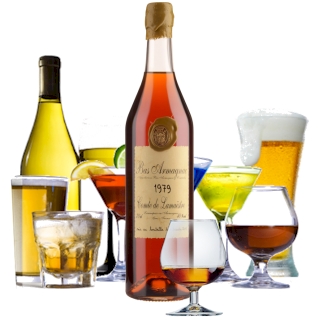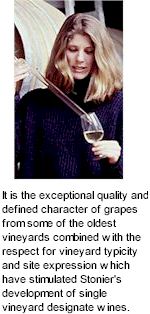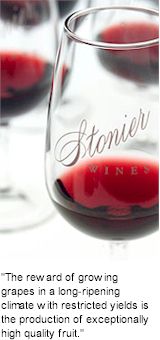


Decades later, the name Stonier is widely recognised as a producer of exceptional Chardonnay and Pinot Noir. At the heart of Stonier lies a meticulous approach to viticulture and winemaking. A desire to reflect the imprint of each site, through subtle variations in flavour and texture, interweaving these differences to form elegant wines of seamless complexity has earned Stonier a place amongst the best Pinot Noir and Chardonnay producers in Australia. Stonier sources Chardonnay and Pinot Noir from over 150 acres across 5 selected sub-regions; Merricks North, Balnarring, Tuerong, Red Hill and at the estate vineyards in Merricks which span over 50 acres.

Due to the cool climate of the Mornington Peninsula, at each of these sub-regions North and North-East facing sites are favoured as they are protected from the prevailing sea winds whilst retaining maximum exposure to the sun. Stonier's focus on quality in the vineyards is most evident in Merricks where vineyard design and low vine density are prime factors in limiting crop levels to under 3 tonnes to the acre.
Grapes from each of the numerous vineyards are vinified separately to allow ultimate flexibility when finally blending the wine to form the two distinct styles of Chardonnay and Pinot Noir in the Stonier Label and Stonier Reserve wines. An unswerving focus on style and structure ensures that the wines reflect the diverse flavours and texture of fruit sourced from across these five sub-regions without any one aroma or flavour dominating the final wine.
Stonier wines are acclaimed internationally amongst the finest styles of cool climate Chardonnay and Pinot Noir from Australia. Stonier's pedigree includes such highlights as Trophies for the 1993 Reserve Pinot Noir and 1995 Reserve Chardonnay, and Decanter's Best New World Red Wine for the 1997 Reserve Pinot Noir.

Three particular vineyards have consistently provided low yield reserve quality fruit. They are located on the Stonier estate in Merricks and further north; warmer sites that face inland- protected from sea winds to maximise ripening potential. The climate and proximity to the sea affects each site differently and the distinctive flavours of the individual vineyards bring complexity to the Reserve blend. The Burgundian benchmark of individual vineyards and expression of site are the most interesting facet of Chardonnay and Pinot Noir production and therefore single vineyard wine has been a logical progression for Stonier. The aim is for typicity from vintage to vintage, rather than the blended complexity of the Reserve.
The Burgundian benchmark of individual vineyards and expression of site are the most interesting facet of Chardonnay and Pinot Noir production and therefore single vineyard wine has been a logical progression for Stonier. The aim is for typicity from vintage to vintage, rather than the blended complexity of the Reserve.
Named after founder (Kenneth) Brian Stonier, the KBS vineyard was planted in 1988 on deep rich red loams adjacent to the winery. KBS vineyard is lyre trellised which opens up the canopy, this combined with its easterly aspect ensures that the vines capture maximum sunlight. The KBS fruit is consistently well balanced with ripe fruit flavours yet high natural acidity. A small portion of fruit is separately bottled as KBS single vineyard wines, the balance forming a key component of Stonier Reserve wines.
The soils under the Stonier Windmill Block are deep red loams & the aspect northerly. The consistency and typicity of blocks from this vineyard provide the basis for Stonier Reserve wines. Due to the high natural acids and delicate flavours from this cool site some fruit is used in Stonier Cuvee. Pinot Noir from the Windmill Block has expressed unique and typical site character inspiring the release of a single vineyard wine.
